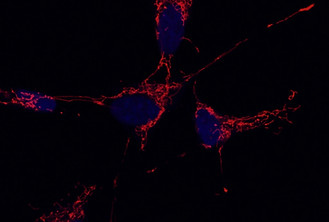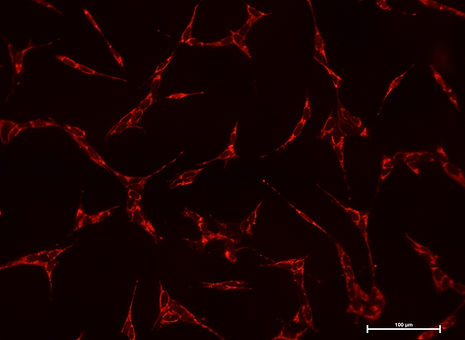
O'Ryan Lab
RESEARCH FOCUS
Molecular Mechanisms in Autism Spectrum Disorder
We are interested in the molecular mechanisms that are involved in the aetiology of ASD, with a specific focus on data from South African populations. This is essential because the majority of molecular autism research comes from countries in the global North, and autism remains understudied in Sub-Saharan Africa. Given the immense genetic variation in African populations, it is important to generate population-specific data. This underlying variation might help us to uncover novel molecular mechanisms that haven't been discovered in European or American populations.
RESEARCH QUESTIONS

Is DNA Methylation altered in a South African ASD Cohort?

Does mitochondrial dysfunction play a role in ASD?

How do mitochondria affect neurodevelopment, identity and function?
Can we use the molecular signatures in our cohort to uncover novel mechanisms in ASD?
So far, our cohort work has demonstrated a consistent signature of altered DNAm and mitochondrial dysfunction and we have uncovered a few central target genes for future mechanistic studies. Our ongoing work aims to translate these molecular signatures into an understanding of molecular mechanisms in autism. On the one hand, we are recruiting a cohort to study gene expression in South African children to investigate whether DNA methylation is associated with changes to gene transcription. On the other hand, we are using an in vitro neuronal cell model system to study how mitochondrial dysfunction might alter neuronal metabolism, differentiation and function. We are particularly interested in the biochemical cross-talk that might form a link between mitochondrial function and neurogenesis, and whether key target genes implicated in our cohort play a role in this relationship. A comprehensive understanding of the complex articulation between many different pathways in autism could help us to understand key molecular players that affect clinical outcomes, well-being and quality of life for autistic individuals in South Africa.

Our research journey from identifying molecular signatures to exploring molecular mechanisms in ASD. (Created with Biorender.com)
What molecular signatures are implicated in a South African ASD cohort?
After recruiting and systematically phenotyping a novel South African cohort, we performed a whole-epigenome screen to study whether DNA methylation (DNAm) was altered in our ASD cohort. We found 898 significantly differentially methylated genes that converged on canonical mitochondrial pathways. This study pointed to evidence for differential DNAm and mitochondrial dysfunction in ASD, so our next study aimed to validate this hypothesis. We used two independent methods to show differential DNAm at several key genes involved in mitochondrial metabolism, function and homeostasis in ASD. This was associated with altered mitochondrial biogenesis and dynamics, and urinary metabolomic profiles that were consistent with mitochondrial dysfunction.
ONGOING WORK

RNA sequencing of a South African ASD cohort
This project aims to investigate whether RNA expression differences between ASD and controls show evidence of mitochondrial dysfunction in ASD. Furthermore, this proposed project will support and contribute to molecular research of ASD in understudied populations.

Investigating Mitochondrial Function
In Neurogenesis
This project uses a biochemical model to study mitochondrial metabolism in neurons. This model aims to identify mechanisms by which mitochondria modulate neurogenesis. This work could highlight how different molecular mechanisms converge in ASD to alter neurophysiology & function.

Metabolic and Immune Mechanisms in A Multipotent NSC Model
This project uses neuronal stem cell model to investigate the relationship between mitochondrial dysfunction and neuroinflammation. This relationship could play a key role in contributing to an increased susceptibility to stress and psychopathology in ASD, which has important implications for quality of life and well-being for autistic individuals.

Mitochondrial Morphology &
Dynamics in ASD
This project uses electron microscopy alongside molecular biology techniques to study how mitochondrial shape changes under metabolic stress. This work could explain how key genes from our cohort study might be involved in neuronal differentiation and function by regulating mitochondrial morphology and dynamics.
To see some of our latest results, check out our most recent conference contributions below:
1. DNA Methylation Screen in a South African Autism Cohort informs in vitro model for mitochondrial homeostasis and neurogenesis. Poster session presented at: International Congress of Human Genetics, February 2023.
2. A molecular framework for autistic experiences: from translation to transformation in autism genomics. Poster session presented at: International Congress of Human Genetics, February 2023.
3. Mitochondrial dysfunction in Autism Spectrum Disorder. Poster session presented at: Federation of European Neuroscience Societies Conference, July 2020.
4. Implications for Autism Spectrum Disorders: Mitochondrial dysfunction and Neuronal Differentiation in SH-SY5Y cells. Poster session presented at: Society for Neuroscience Conference, November 2021.